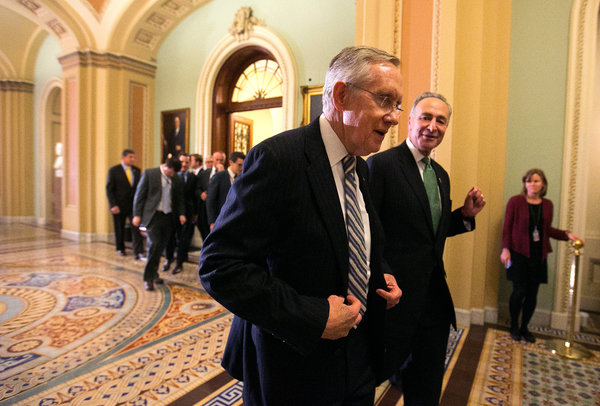
|
Congressional Republicans conceded defeat Wednesday in their bitter budget fight with President Obama over the new health care law, agreeing to end a disruptive 16-day government shutdown and extend federal borrowing power to avert a financial default with potential worldwide economic repercussions. With Treasury warning it could run out of money to pay U.S. obligations within a day, the Senate voted overwhelmingly, 81-18, on Wednesday evening to approve a proposal hammered out by Republican and Democratic leaders after the House was unable to move forward with any resolution. The House was expected to follow suit within hours and approve the Senate plan, which would finance the government through Jan. 15 and raise the debt limit through Feb. 7. Shortly after the vote, Mr. Obama praised Congress for action and said the vote cleared the way for substantive budget negotiations. "We now have an opportunity to focus on a sensible budget that is responsible, that is fair, that helps hard-working people all across this country,” he said. The result of the fight, which threatened the federal credit rating, was a near total defeat for the Republican conservatives who had engineered the budget impasse as a way to strip the new health care law of financing even as registration for benefits opened Oct. 1 or, failing that, to win delays in putting the program into place. Speaker John A. Boehner, the leader of conservative House Republicans whose push to strip money for the health law led to the shuttering of much of the government on Oct. 1, said that the House would not block a bipartisan agreement reached in the Senate that yielded virtually no concessions to the Republicans. “We fought the good fight,” Mr. Boehner said in an interview with the radio station WLW-AM in Cincinnati. “We just didn’t win.” In a statement issued as the Senate and the House prepared to vote on the proposal, Mr. Boehner said: “The fight will continue. But blocking the bipartisan agreement reached today by members of the Senate will not be a tactic for us.” The decision came about 24 hours before the Treasury was due to exhaust its borrowing authority, putting the nation on the brink of a default. Mr. Boehner had earlier told colleagues privately that he would not allow the nation to default. The Senate is expected to vote on the bill Wednesday evening, with final passage coming late Wednesday or early Thursday. Under the agreement, the government would be funded through Jan. 15, and the debt ceiling would be raised until Feb. 7. The Senate will take up a separate motion to instruct House and Senate negotiators to reach accord by Dec. 13 on a long-term blueprint for tax and spending policies over the next decade. Senator Mitch McConnell of Kentucky, the Republican leader, stressed that under the deal, which he negotiated with Senator Harry Reid of Nevada, the majority leader, budget cuts extracted in the 2011 fiscal showdown were not reversed, as some Democrats had wanted, a slim reed that not even he claimed as a significant victory. The deal, Mr. McConnell said, “is far less than many of us hoped for, quite frankly, but far better than what some had sought.” “It’s time for Republicans to unite behind other crucial goals,” he added. Chastened Senate Republicans said they hoped the outcome would be a learning experience for lawmakers in the House and the Senate who shut down the government in hopes of gutting Mr. Obama’s signature domestic achievement, the Affordable Care Act. Instead of using the twin deadlines of an end to government funding and borrowing authority to address the drivers of the federal deficit, conservatives focused on a law they could never undo as long as Mr. Obama is president, several senators said. “We took some bread crumbs and left an entire meal on the table,” said Senator Lindsey Graham, Republican of South Carolina. “This has been a really bad two weeks for the Republican Party.” Senator Richard Burr, Republican of North Carolina, took a swipe at Senators Ted Cruz, Republican of Texas, and Mike Lee, Republican of Utah, as well as House members who linked further funding of the government to gutting the health care law, which is financed by its own designated revenues and spending cuts. “Let’s just say sometimes learning what can’t be accomplished is an important long-term thing,” Mr. Burr said, “and hopefully for some of the members they’ve learned it’s impossible to defund mandatory programs by shutting down the federal government.” But while Mr. Cruz conceded defeat, he did not express contrition. “Unfortunately, the Washington establishment is failing to listen to the American people,” he said as he emerged from a meeting of Senate Republicans called to ratify the agreement. Mr. Cruz promised not to use parliamentary tactics to block a final vote, raising hopes that the government will be opened and the debt ceiling will be lifted before Thursday, when the Treasury exhausts its borrowing authority. “From our side, I don’t see any evidence of delay,” said Senator Rand Paul, Republican of Kentucky and a Cruz ally. Jay Carney, the White House press secretary, said that Mr. Obama supported the compromise reached by the Senate leaders, and he urged lawmakers in both chambers to pass it quickly. Mr. Carney said the agreement “achieves what’s necessary” to reopen the federal government after 16 days, and removes “the threat of economic brinksmanship” that raised the possibility of a government default. “We leave parliamentary procedures to the Congress,” he said. “But we obviously hope that each house will be able to act swiftly. We are already on Day 16 of a wholly unnecessary shutdown of government.” |
據(jù)美國媒體報(bào)道,當(dāng)?shù)貢r(shí)間10月16日晚,美國國會(huì)參眾兩院先后投票通過一項(xiàng)聯(lián)邦政府臨時(shí)撥款議案,同意結(jié)束持續(xù)多日的政府關(guān)門局面并提高聯(lián)邦債務(wù)上限。由此,這場曾經(jīng)一度僵持不下的預(yù)算紛爭以國會(huì)共和黨人做出重大讓步而暫時(shí)告終,美聯(lián)邦政府將很快恢復(fù)正常運(yùn)作。 ***奧巴馬贊許兩黨協(xié)作 距離美國觸及債務(wù)上限不到24小時(shí)、整個(gè)國家被推向債務(wù)違約的邊緣之際,參議院多數(shù)黨即民主黨領(lǐng)袖里德和共和黨領(lǐng)袖麥康奈爾16日下午宣布達(dá)成協(xié)議。當(dāng)晚,協(xié)議被提交至參議院全體會(huì)議投票表決獲得通過。該議案決定為聯(lián)邦政府撥款至明年1月15日,并臨時(shí)提高聯(lián)邦債務(wù)上限至明年2月7日。 隨后,這份議案被迅速送交眾議院表決。眾議院議長、共和黨人博納16日表態(tài)不會(huì)阻撓議案在眾議院的表決,果不其然,在民主黨議員的一致支持和共和黨少數(shù)議員的支持下,該議案在眾議院以285票贊成、144票反對的投票結(jié)果順利過關(guān)。 此前參議院投票通過議案的消息一經(jīng)傳開,美國總統(tǒng)奧巴馬隨即對國會(huì)此舉表示嘉許,并稱參議院的投票為下一階段的實(shí)質(zhì)性預(yù)算談判掃清了道路。“現(xiàn)在,我們終于有機(jī)會(huì)集中精力、探討制定一個(gè)合理、公平、負(fù)責(zé)任的預(yù)算案,全國各地辛勤工作的人們都將因此受益。” 就在眾議院即將進(jìn)行投票前,奧巴馬還在白宮發(fā)表講話:“如果議案在眾議院通過,我們將撥開籠罩在美國經(jīng)濟(jì)和美國人民頭頂上的不確定性烏云。”奧巴馬表示一旦收到國會(huì)遞交的議案,他將立即簽署生效,聯(lián)邦政府也將“即刻”開門,他還希望類似的驚險(xiǎn)戲碼不再重演。 ***共和黨人認(rèn)輸 “已經(jīng)歷時(shí)16天的聯(lián)邦政府部分關(guān)門將在17日結(jié)束,迫在眉睫的違約警報(bào)也得到解除。”美國媒體指出,此次漫長而艱難的預(yù)算斗爭曾經(jīng)一度威脅到美聯(lián)邦政府信用評級,甚至對全球經(jīng)濟(jì)造成潛在負(fù)面影響,“從斗爭的結(jié)果來看,共和黨人幾乎徹底失敗了。他們試圖利用預(yù)算僵局、阻撓奧巴馬醫(yī)改法案實(shí)施,但國會(huì)通過的議案中僅包含對醫(yī)改法案極小的變更。” 而共和黨也坦然承認(rèn)己方在斗爭中落敗。眾議院議長、共和黨人博納在辛辛那提市接受電臺(tái)采訪時(shí)說:“我們打了漂亮的一仗,只是沒有取得勝利。” 參議院共和黨領(lǐng)袖麥康奈爾認(rèn)為,國會(huì)通過的這份臨時(shí)撥款議案“遠(yuǎn)遠(yuǎn)低于”許多共和黨人的期許,“不過坦白來講,也比某些人所尋求的要好得多”。“現(xiàn)在,是時(shí)候讓共和黨人團(tuán)結(jié)起來、為其他重要目標(biāo)而戰(zhàn)斗了!”麥康奈爾說。 還有部分共和黨人表示他們將把此次經(jīng)歷視為一次“學(xué)習(xí)經(jīng)驗(yàn)”,從中吸取教訓(xùn)。“我們拿走了一些面包屑,卻把整頓大餐留在桌子上。”來自南卡羅來納州的參議員格雷厄姆說,“對于共和黨而言,過去兩周實(shí)在太糟糕了。” 資深參議員麥凱恩曾警告其共和黨同仁不要將他們修改奧巴馬醫(yī)改法案的需求與政府債務(wù)上限綁在一起,他16日公開表示:“我在參議院待了這么多年,這是我見過的最令人羞愧的一幕。”民調(diào)結(jié)果顯示,預(yù)算僵局令共和黨在美國民眾心目中的形象大打折扣。 相關(guān)閱讀 美21人集體“自焚” 創(chuàng)吉尼斯世界紀(jì)錄 (譯者 肉肉融 編輯 yaning) |
